Keri Wyatt Kent's Blog, page 8
December 4, 2018
Waiting for the light of freedom

Advent is a time of waiting, and at our border (and indeed, at other borders around the world), travelers are waiting, now, for the chance to find new life. They are waiting for the chance to wait even longer.

Photo by Jovi Waqa via StockSnap.
The people walking in darkness have seen a great light; on those living in the land of deep darkness a light has dawned. (Isaiah 9:2)
Imagine a family, the father gunned down, the mother and her children threatened with rape, extortion, death. Desperate, they flee. Both U.S. and International law allow those who fear harm in their country of origin to request asylum. Some will have it granted, some will not. But they walk, miles and miles, in the darkness of uncertainty and fear, hoping to find the light of freedom.
Imagine that family in a tent city, huddled together in the darkness at night, afraid but yet, hoping against hope.

Photo by Hans Vivek from StockSnap
Where are you walking in darkness, hoping to find the light of freedom? Where are you hoping against hope?
Jesus said to his followers, “You are the light of the world–like a city on a hilltop that cannot be hidden.” (Matthew 5:14)
There is no crime in asking for freedom, in seeking hope. Those who come know the journey is long and difficult and dangerous, but what they are fleeing is far worse. What would you do if you were them? Put yourself in their worn shoes. Try on their desperation.
This season of waiting, take a moment to breathe. We are waiting for the light of Christ, and we are also called to be that light. Perhaps the journey of others invites us into a journey of our own.

What would it look like for us to be light to the suffering, to those who are waiting, fleeing, afraid?
Next Steps:
Educate yourself about the border crisis by reading this article.
Learn more about immigration by reading Matthew Soerens and Jenny Yang’s book Welcoming the Stranger, or Sarah Quezada’s book Love Undocumented
Subscribe to this blog to get updates throughout the Advent season
The post Waiting for the light of freedom appeared first on Keri Wyatt Kent.
December 3, 2018
Advent: Coming of the King of Peace

This Advent, gather with us in this space. Take a moment to breathe, to read very short reflections, to consider the ties between this ancient tradition and the challenges and joys of our current situation. Please hit ‘subscribe’ to join us in the contemplative journey. To go deeper, try one of the Next Steps.
Oh come, Desire of nations, bind
In one the hearts of all mankind
Bid Thou our sad divisions cease
And be Thyself the King of Peace
Rejoice, Rejoice
Emmanuel shall come to thee O Israel
—O Come O Come Emmanuel, Public Domain

Last night I ventured out in the cold rain to go to The Practice for the first Sunday of Advent. We sang O Come O Come Emmanuel, its haunting melody filling the chapel. We reflected in silence, the holy space offering a chance to breathe.
Advent is far more than a countdown to Christmas. The Latin adventus means “coming” and we anticipate the coming of Christ, as he did 2000 years ago, as he will in the future. And also, how he is coming into our hearts, lives, and actions right now. It’s a time of waiting, of seeking. Traditionally, a time of reflection rather than hurry. The opposite of what it has become, perhaps.
Lately we’ve been aware of someone “coming”—a group of travelers, fleeing violence and poverty. The irony of a people coming and waiting during Advent, journeying toward the hope of freedom, and yet being opposed and unwelcomed by so many, hit me as I sang, “bid Thou our sad divisions cease.”
Who comes? The King of Peace. As a helpless baby, born into poverty. So many who claim to be Christians follow a King of Strife, Fear and Division. They appear to have forgotten that Jesus called us to love our neighbors, and even to love those we consider enemies. We are called to be peacemakers. How? Jesus was clear: feed the hungry, visit the prisoners, welcome strangers.
How can we, this Advent, wage peace?
Next steps:
Listen to the hymn O Come O Come Emmanuel, listening for one word or phrase to make your prayer today.
Listen to the Practice podcast here.
The post Advent: Coming of the King of Peace appeared first on Keri Wyatt Kent.
November 15, 2018
Best surprise of old age? Writing her own book

This is the first in an occasional series of customer profiles. A Powerful Story just helped Barbara McLennan, age 80, publish a book.
“Keri Wyatt Kent lives up to her Powerful Story name. She successfully guided me through the entire step-by-step process of producing my book. Although I had a
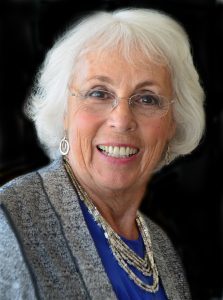
Author Barbara McLennan
skeleton of copy in hand when she started with me, she was artfully helpful in the actual writing, then editing and sequencing the chapters.
She offers tried and tested connections with others to design the pages, do final editing and not only print copies, but set up all that is crucial and necessary for self-publishing. Her mode of operation is quick and to the point, yet very personal and understanding. I highly recommend her services.”
Barbara McLennan, author of Surprised by Old Age: From a Bucket List to a List of Buckets
Barb McLennan has always loved writing, especially poetry. Her annual Christmas letters always contained family updates captured in verse. A few years ago, she reconnected with one of her husband’s college friends, Dr. Arthur Ammann. Dr. Ammann was working on a book, and needed an editor and collaborator. In her 70s, Barb’s long-time dream of writing a book came true.
(In)Visible: From Obscure to Valuable released in 2014, and publishing it taught Barb a lot. A Powerful Story played a small role in that project, when Barb and Art asked Keri to read the manuscript and offer suggestions and edits. The experience stirred in Barb a desire to write a book on her own.
Barb’s 80th birthday came this year, and with it, a strong desire to make her book a reality. The idea for her book grew out of her experiences.
As she and friends grew older, she kept finding herself surprised by the aging process, which brought challenges and feelings she’d never anticipated. She was surprised by the way age, and all of its attendant challenges, crept up on her.
When she talked with friends, her working title of “Surprised by Old Age” resonated deeply with almost everyone. She began writing a few poems, and then asked friends to contribute essays, thoughts, and poems to add to the book. She collected newspaper articles, quotes, and stories.
Barb contacted Keri at A Powerful Story to ask for help in transforming her collection of essays and poems into a published book. We were excited to help Barb make her publishing dream a reality.
Our publishing services began with an assessment of Barb’s manuscript, which although she’d been working on it for a while, was still a bit short to be a full-length book. We sorted through her file folder of quotes, stories and articles. We provided advice and guidance as she expanded the manuscript and added more chapters.
Our next step in the publishing process was a developmental edit, in which we helped shape the overall flow of the book. Barb had a clever hook with the idea of different “buckets” to describe various situations in old age, and the book included a chapter about the movie The Bucket List. We provided creative consulting on the subtitle, suggesting “From a Bucket List to a List of Buckets” which indeed became the subtitle. We rearranged chapters, figured out a structure and flow for the book, and helped her decide what to add, rewrite or eliminate from the manuscript to make it as strong as possible.
Copy-editing came next, as our editing team carefully checked sentence structure, punctuation and grammar.Our publishing service includes checking citations, making sure all footnotes and citations were correct and followed copyright regulations. The book contained not only original poems and essays but quotes from a variety of sources.
Next, the Powerful Story design team went to work, designing the interior pages, formatting the book for print and ebook formats. Barb’s son Todd, of Todd McLennan Photography, stepped in to design the cover. We wrote back cover copy and made sure everything was perfect on both the exterior and interior of the book.
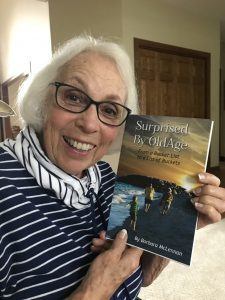
Barb was delighted with her book.
Finally, the book was ready to print and be published. Our favorite digital printing company, Copresco, printed digital copies of the book. Barb loved the results. At the same time, we helped Barb set up an account on CreateSpace, Amazon’s self-publishing platform, as well as Kindle Direct Publishing. We put both an ebook version and a print-on-demand version on Amazon. See it here.
Barb is delighted by the finished product, and is currently working to market her book and send out review copies. To purchase a copy of her book, visit her amazon page at amazon.com/author/bmclennan
Barb’s project reminds us that it is never too late to follow your dream of writing and publishing a book. Please click to contact us for a free consultation.
The post Best surprise of old age? Writing her own book appeared first on Keri Wyatt Kent.
June 6, 2018
The surprising secret to experiencing abundance

We all long for it: the abundant life. I don’t know about you, but I stand against a scarcity mentality steeped in fear. I want to believe that I have more than enough, even when things seem bleak. How can we experience abundance?
Spiritual practices, GodSpace practices, will guide us. Here’s an excerpt from my book GodSpace that looks at the story of an amazing woman from the Bible, and how she experienced God’s miraculous and abundant provision. (The following is adapted from my book GodSpace.)
To me, the ultimate story of hospitality is that of the widow and Elijah. The widow would never be featured in Martha Stewart’s magazine or anything close. But she chose to practice hospitality when it was hard. Here’s her story as found in 1 Kings 17:
Some time later the brook dried up because there had been no rain in the land. Then the word of the Lord came to him: “Go at once to Zarephath in the region of Sidon and stay there. I have directed a widow there to supply you with food.” So he went to Zarephath. When he came to the town gate, a widow was there gathering sticks. He called to her and asked, “Would you bring me a little water in a jar so I may have a drink?” As she was going to get it, he called, “And bring me, please, a piece of bread.”
“As surely as the Lord your God lives,” she replied, “I don’t have any bread—only a handful of flour in a jar and a little olive oil in a jug. I am gathering a few sticks to take home and make a meal for myself and my son, that we may eat it—and die.”

Photo by Malidate Van from Pexels
Elijah said to her, “Don’t be afraid. Go home and do as you have said. But first make a small loaf of bread for me from what you have and bring it to me, and then make something for yourself and your son. For this is what the Lord, the God of Israel, says: ‘The jar of flour will not be used up and the jug of oil will not run dry until the day the Lord sends rain on the land.’”
She went away and did as Elijah had told her. So there was food every day for Elijah and for the woman and her family. For the jar of flour was not used up and the jug of oil did not run dry, in keeping with the word of the Lord spoken by Elijah.

Photo from pixabay.com
Like so many women of the Bible, we don’t know her name: she’s just “a widow.” The Bible labels her “the widow of Zarephath,” the place she lives. God tells Elijah that he’s directed the widow to feed him, but their initial conversation sounds like she didn’t get the memo about that. But Elijah tells her the secret of abundance: “don’t be afraid.”
Zarephath, scholars tell us, was known as a place where the main industry was the “refining and smelting of metals.” Think Pittsburgh or Gary, Indiana in their steel factory heyday. It’s a wonderful detail that we might overlook, how a woman living in a town known for refining would have her own faith tested and strengthened by the fire of an inconvenient request. How fitting that in a place where ore was transformed into precious metal, a bit of flour and the last few drops of oil were miraculously turned into three years worth of provision.
Elijah comes during a famine, and asks her to practice hospitality: a simple meal of bread and water. Martha Stewart, or even Martha of Bethany, she is not. “I’m getting ready to eat and die,” she says, implying that she might wish the same fate on this demanding prophet.
But she is invited to trust. Elijah calmly challenges her to take a chance on divine provision. In essence, the prophet promises a miracle. There will be enough, if you are generous. Don’t be afraid. If you are not generous, your prediction of this meal being your last might be accurate. If you give to God first (he asks that she make him a loaf of bread, then make one for herself and her son), God will provide.
It’s not a threat. It’s a promise. Trust, and watch what God will do. Note that Elijah doesn’t demand to be fed instead of her son, but only to share what they have.
In the same way, the practice of hospitality invites us to trust, to pull up another chair to the table and share a modest meal. The widow made bread of flour and olive oil, served with water. She set the bar for “biblical hospitality” pretty low, with regard to the food. But she set it pretty high for trust. She kept on giving what she thought was the very last of her provisions.
What went through that widow’s heart during that first meal with Elijah? And what happened when she went back to the jar the next day, and shook out another portion of flour? Then poured out a few more squirts of oil? And the next day, and the next? Surely, her amazement and wonder grew each day. But did she, each day, think—this is it. This is where God’s provision ends. Did she doubt?
We’d understand if she did, right? But whether she doubted isn’t mentioned. If she did doubt, she wasn’t punished for that. Despite her doubt, she acted. She made the bread—embodying her faith by pouring out oil, kneading bread, handing it to Elijah, then her son. Sometimes we doubt, and that’s understandable and okay. But when we risk obedience, our risk is rewarded. We get to experience doubt-dispelling miracles that we’d never get to see if we didn’t take that chance.
What would it look like for you to follow the example of this widow? To be generous, not out of your abundance, but out of what you’ve got. Generosity and hospitality, in divine alchemy, turn scarcity into abundance.

Read more of GodSpace, or order a copy, here.
The post The surprising secret to experiencing abundance appeared first on Keri Wyatt Kent.
May 11, 2018
Learning to Speak God from Scratch

Sacred words are becoming a dying language, according to Jonathan Merritt. But in the words of Monty Python, they are “not dead yet” and we can revive them. Words matter. As I writer, I believe this to my core.
Jonathan Merritt’s forth-coming book, Learning to Speak God from Scratch, is not just a critique of Christian-eze platitudes or clichés. Far from it. Jonathan, who is an amazing writer, is also a fastidious researcher. He was intrigued by an article which asserted that the use of words like grace, mercy, faith, sacrifice and so on were declining in the national conversation. He teamed up with Barna to survey 1000 people on the frequency of spiritual conversations.
[image error]
Jonathan is an award-winning contributor for The Atlantic, and has written for USA Today, The New York Times and other national publications. You may have seen him providing commentary on religion and culture on CNN, Fox News, MSNBC, or NPR. Perhaps you’ve read his Faith & Culture blog on Religious News Service site. (If you’re not reading it, you probably should. Great stuff.)
Jonathan found that the language of faith is on the decline, in part because we don’t always know what we mean when we “speak God.” He also learned that more than one-fifth of his survey respondents said they have not had a spiritual conversation at all in the last year. About 7 percent said they talk about spiritual matters no more than once a week.
“When we lose our spiritual vocabulary,” he writes, “we lose much more than words. We lose the power of speaking grace, forgiveness, love, and justice over others.”
Learning to Speak God from Scratch is based on research, but Jonathan’s excellent reporting on that research is woven into the story of his move to Brooklyn, NY, where he found that very few people “spoke God” and when they did their words might mean something entirely different. The narrative of Jonathan learning a new city, even as he re-learns language, keeps the book moving forward and makes it readable and relatable.
His book is beautifully written (as one would hope a book on language would be), and surprisingly optimistic. He asks intriguing questions to those of us who think we are “speaking God.” We speak in clichés that we can’t explain. We are sometimes sloppy in our thinking and therefore in our speaking. We rush. As Jonathan writes, “We do not often quiet ourselves long enough to ask, What am I saying when I’m saying what I’m saying?”
The book explores a number of specific “God words” such as prayer, pain, disappointment, mystery, etc. Each gets its own chapter where Jonathan explores not only the word, but the idea behind it. The book reads like a conversation with a really smart (he’s got two graduate degrees) and kind friend.
My favorite chapters were the ones on Spirit and Family. They’re grounded in solid scholarship but challenge the status quo. Brilliant. Intrigued? Order the book now.
I had the pleasure of hearing Jonathan speak at this year’s Festival of Faith and Writing. He was brilliant and witty and articulate. So of course when I saw him in the lobby at the end of the festival, mildly stressing about the impending snowstorm like the rest of us, I had to fan-girl a bit and say hello (and gush about how much I enjoyed his talk). He generously offered me a copy of his book, which I promised to read and review (and buy for all my friends). I’ve already pre-ordered more copies, because I know plenty of folks who will, like me, just love this book.
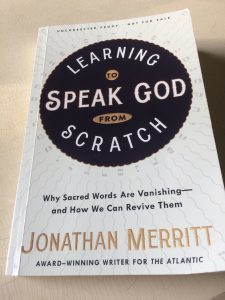
A book’s pre-orders, before it even releases, often determines its success. So don’t wait. If you think you might want to buy it when it comes out–don’t wait! Go pre-order Learning to Speak God from Scratch here. And visit Jonathan’s website to learn more about him.
The post Learning to Speak God from Scratch appeared first on Keri Wyatt Kent.
April 25, 2018
Where is God? A lesson from bulbs
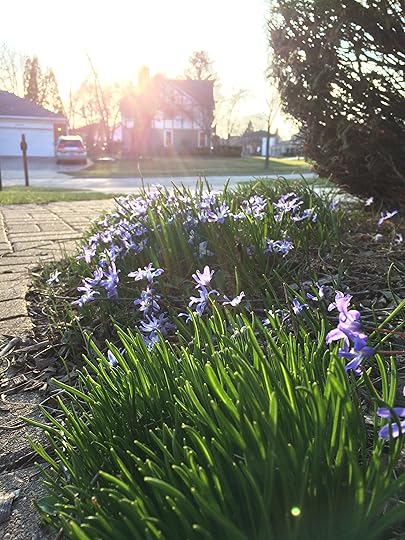
“Where is God in this mess?”
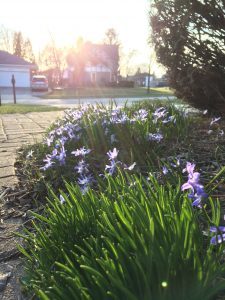
“Does God even hear my prayers?”
In my work as a pastor, I hear these kinds of questions a lot. And in some of the situations where I sit with people in their pain, offering simply presence and prayer, I have to admit that I’m asking the same questions. Our souls ache when God seems far off, when doubt crowds in and faith flickers.
However: our inability to hear or feel God is not an accurate indicator of God’s activity in our lives. Here’s what I know: sometimes, God works in ways we cannot see or feel, in our limited capacity. God sees, hears, and works, friend–even if you can’t quite see it yet. Even if all seems dry and lifeless.
As the Ignatian prayer of Pierre Teilhard de Chardin reminds us, we can Trust in the slow work of God.
I was reminded of this truth this week as I walked around my yard. It is spring in the Midwest, which is to say one day it is snowing sideways and the next it is 50 and sunny and feels to our winter-weary souls like the tropics.
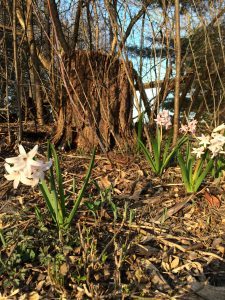
Hyacinths
In spite of the lateness of spring this year, my yard is full of stubborn, sturdy flowers. Crocus, scilla, hyacinths, daffodils come up, even among the dry sticks and leafless branches. Bursts of color delight among the drab vestiges of winter.
All of these flowers begin their lives as bulbs—wizened brown bits, reminiscent of dehydrated onions. In an autumn years ago, when my children were still small and underfoot, we planted bulbs. Digging holes, dropping in the small, seemingly lifeless orbs, covered in papery brown skins.
That spring, and every spring since, the bulbs shoot forth new life. Crocuses that often come up through the late spring snows. Scillia that have divided and spread and now line my front sidewalk. Flowers that sprout up in the middle of the lawn, where squirrels have buried stolen bulbs from the garden and forgotten them. Their inadvertent gardening means my lawn is scattered with blooms.
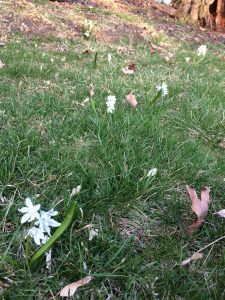
Busy squirrels replant bulbs in the lawn.
My point is this. In winter, I cannot see the slow work of the bulb, under the frozen ground and layers of snow and ice. It seems the bulb is silent. And yet—beauty comes. Every year. And the beauty will only come if the bulb gets cold, and experiences winter. And the flowers trust in the slow work of God. The miracle of new growth, of seasons. Spring will follow winter.
The promise of beauty is not a promise that life will be easy and breezy. Sometimes the beauty God is crafting is in your character. The fruit of God’s Spirit looks like patience, kindness, goodness, gentleness, self-control. Patience, for example, grows in situations that test and try our patience, that would make us impatient, except that God is slowly transforming us. Sometimes we ask if God hears us, but what we need to ask is: do we hear God? Are we quiet enough to listen?
Where is God in the mess? Does God hear our prayers? I still believe yes. But I also believe God is not our Siri or Alexa, to whom we can speak and expect immediate servitude. It doesn’t work that way. The beauty will come—in due season. Trust that even if you can’t see it yet,

Hyacinths
God is at work. Trust that the beauty will come.
Patient Trust By Tielhard de Chardin
Above all, trust in the slow work of God.
We are quite naturally impatient in everything
to reach the end without delay.
We should like to skip the intermediate stages.
We are impatient of being on the way to something
unknown, something new.
And yet it is the law of all progress
that it is made by passing through
some stages of instability—
and that it may take a very long time.
(read the whole poem here)
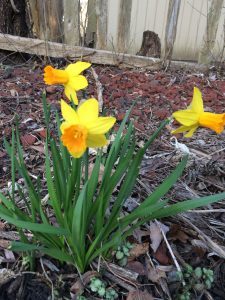
Daffodils
The post Where is God? A lesson from bulbs appeared first on Keri Wyatt Kent.
April 18, 2018
A springtime gift for your soul: Sabbath
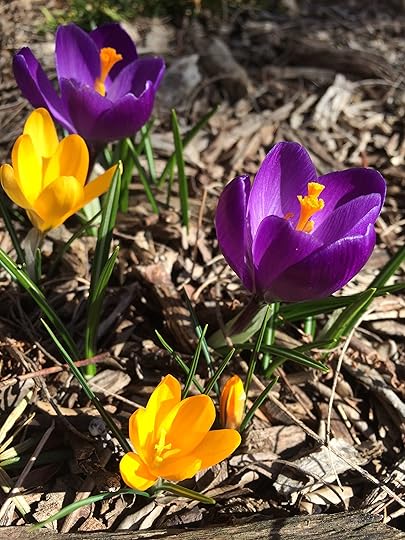
Winter seems unwilling to yield to spring here in the Midwest, and I know we all feel weary. A month ago, my crocuses bloomed.
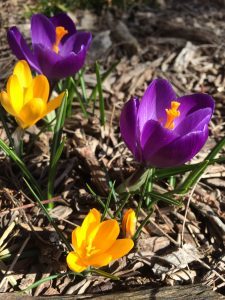
Crocuses
This week, we’re getting snow. Check out this picture of my run. If you zoom in, you can see the deer standing by the road. If this scene looks like winter, it’s because–it is still winter here.

My run, complete with snow and deer.
But May is coming. And with it, one of the most insidiously busy times of year. It’s a dozen extra small things that fill your schedule in springtime, and you know—they’re right around the corner.
So between now and Memorial Day, remember to breathe. I want to offer a gift: soul care. Take just a moment now and then to slow down, to create some space. To help, today launches a series of Wednesday blog posts: bite-sized chunks from my book GodSpace. A two-minute read to tend to your soul and remind you that you can do this, that God is there in the midst of the chaos.
Today, let’s talk about the gift of Sabbath:
Hurry taints even our spirituality. A franticness keeps us at the surface and doesn’t let us rest in God’s presence. We rush through prayer. We add another church activity to our crammed schedules. We faithfully read our Bible but forget what we’ve read a moment later. Our faith can feel disconnected, hollow.
To our weary souls, God offers the Sabbath. Wrapped in the words of commandment and law, we may not recognize it for what it is: a gift. The only way to unwrap it is to practice it. When we do so—not perfectly, not legalistically, but expectantly and humbly—we receive the gift, the grace, of time. We all are given seven days in a week. What we do with those days can allow us to see God, and experience the divine, or not.
What if the ancient practice of Sabbath—a day to set aside work and focus on God—could be the gateway to other practices that impact our pace of life, our experience of God’s grace, our awareness of God’s presence? What if taking a day off actually made us more patient, gentle, more aware of the needs of others?
What if other spiritual disciplines, flowing out of Sabbath, could also open up space for God? What if slowing our pace allowed us to enjoy God in new ways, through practices we may never have considered? What if loving our neighbor begins with slowing down enough to actually notice our neighbor? What if our daily lives could be interwoven with practices we didn’t have to go to the monastery to engage in?
If we slow down a bit, we might have time to consider the questions: What does the pace of my life have to do with the health of my soul? How does the health of my soul impact the people around me, the people I’m trying to love: spouse, neighbors, kids?
Want more? Subscribe to my blog and you’ll receive a free copy of the GodSpace study guide.
Adapted from GodSpace: Embracing the Inconvenient Adventure of Intimacy with God.
The post A springtime gift for your soul: Sabbath appeared first on Keri Wyatt Kent.



